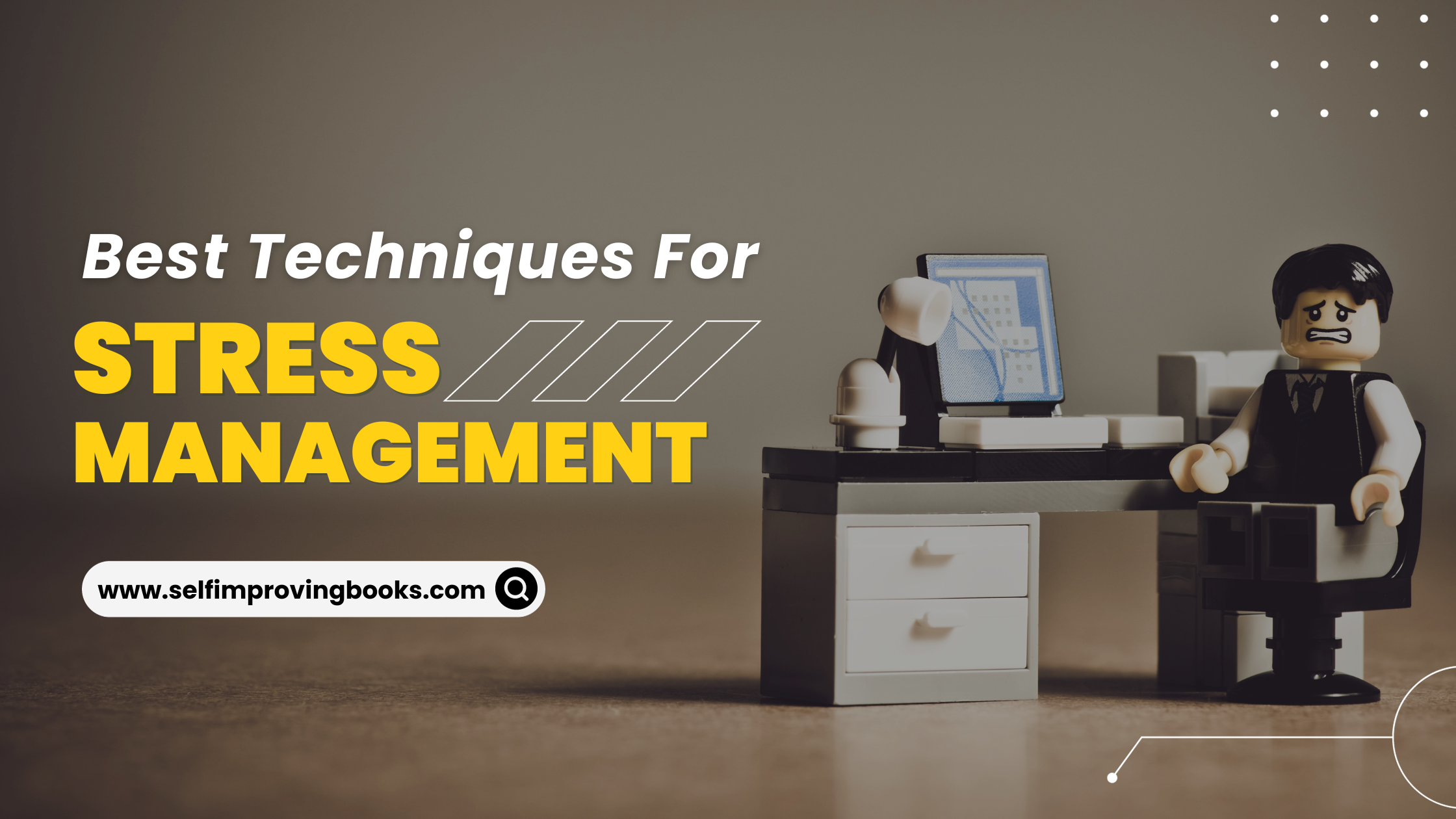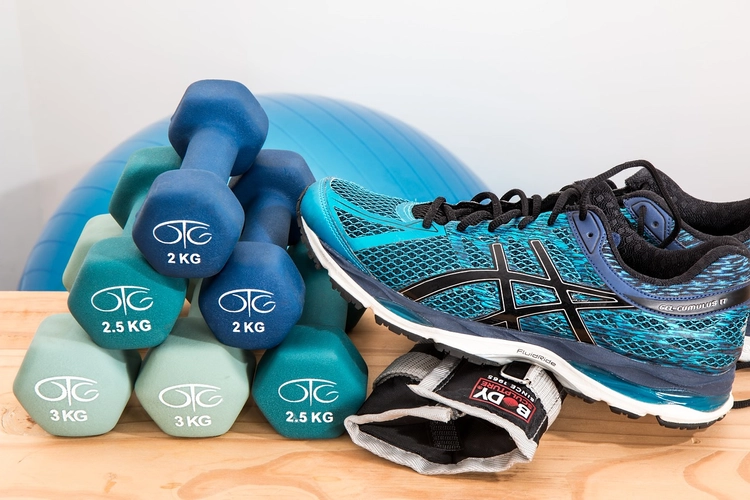Stress Management Techniques that Actually Work 2023

Did you know 48% of employees in the United States experience a lot of stress Everyday?
In this article, I’m going to show you some practices, and knowledge to relax, feel better, be calmer, and I will tell you stress management techniques that actually work in 2023.
List Of Content:
What Is Stress Management?

Stress management involves the art of applying practical methods and strategies to skillfully navigate and alleviate the impact of stress on our physical and emotional well-being.
These methods encompass a range of practices, including relaxation, mindfulness, effective time allocation, setting personal boundaries, and the seeking of guidance from trusted individuals or professionals.
Best Relaxation Techniques for Stress Relief
1. Progressive Muscle Relaxation (PMR): PMR is a method that systematically tackles stress by dealing with each muscle group one by one. It begins from your toes and moves upwards, letting you release physical tension. Whether you’re seated or lying down, it’s a valuable tool.
Steps for PMR:
- First, find a quiet and comfortable spot.
- Shut your eyes and take several deep breaths.
- Begin by tensing your toes, then relaxing them.
- Gradually work your way up, paying attention to the sensations of tension and release.
- Repeat as needed for deeper relaxation.

2. Diaphragmatic Breathing (Deep Belly Breathing): Deep belly breathing is a deceptively simple yet potent technique for stress relief. It emphasizes deep inhalations into your diaphragm instead of shallow chest breaths, and you can do it discreetly almost anywhere.
Steps for Deep Belly Breathing:
- Look for a peaceful spot to sit or lie down if possible.
- Place one hand on your chest and another on your abdomen.
- Inhale deeply through your nose, letting your abdomen expand.
- Exhale slowly through your mouth, focusing on exhaling longer than inhaling.
- Repeat several times, gradually letting go of tension.

3. Guided Imagery and Visualization: This technique lets your mind escape to a tranquil, stress-free place through guided imagery. It’s a powerful method to distance yourself from stress and gain a fresh perspective.
Steps for Guided Imagery:
- Find a quiet place to sit or lie down.
- Shut your eyes and take deep breaths for relaxation.
- Create a mental sanctuary, like a serene beach, forest, or meadow.
- Engage all your senses in this mental retreat, feeling the sun’s warmth, hearing nature’s sounds, and smelling the surroundings.
- Spend a minimum of 10-15 minutes in this peaceful mental escape.

4. Mindfulness Meditation: Mindfulness meditation requires you to remain in the present without judgment. It’s a potent stress-relief technique, offering mental clarity and inner peace.
Steps for Mindfulness Meditation:
- Seek a quiet, cozy place to sit or lie down.
- Close your eyes and take several deep breaths.
- Concentrate on your breath, sensing the air entering and leaving your nostrils.
- When your thoughts drift, gently guide your attention back to your breath without self-criticism.
- Start with 5-10 minutes and gradually extend the time.

5. Progressive Relaxation Techniques: Progressive relaxation involves gradually relieving tension from your body by focusing on muscle groups. You can explore methods like autogenic training, which envisions warmth and heaviness in different body parts. These practices foster both physical and mental relaxation.
Steps for Progressive Relaxation:
- Look for a peaceful setting.
- Close your eyes and take unhurried, deep breaths.
- Center your attention on a particular muscle group, such as your arm.
- Picture warmth and heaviness in that muscle group.
- Progress through each muscle group, deepening your sense of relaxation.
These techniques can be tailored to your preferences and needs for optimal stress relief. Experiment with them to discover which methods resonate best with you.
Best ways to manage stress
1. How to relieve stress in the moment
Here are practical ways to ease stress in the moment:
1. Deep Breathing:
Inhale slowly through your nose, hold for a few seconds, and exhale gently through your mouth. Deep breaths soothe your nervous system and alleviate stress.
2. Mindfulness Meditation:
Embrace mindfulness by concentrating on the present. Tune in to your breath, physical sensations, or your immediate surroundings. This can swiftly calm stress and anxiety.
3. Progressive Muscle Relaxation:
Tense and release each muscle group, starting from your toes and working up to your head. This method releases physical tension, offering instant stress relief.
4. Visualization:
Close your eyes and envision a serene, comforting place, like a tranquil beach or a lush forest. Picture the sights, sounds, and sensations in this haven to divert your mind from stress.
5. Grounding Techniques:
Focus on your body or surroundings. Feel the texture of objects, touch various surfaces, or tread barefoot on natural ground for grounding yourself.
6. Laughter:
Enjoy a funny video or reminisce about a hilarious memory. Laughter triggers the release of endorphins, natural stress alleviators.
7. Positive Affirmations:
Counter negative thoughts with positive affirmations. Tell yourself, “I am calm and in control,” to reduce stress in the moment.
8. Aromatherapy:
Inhale soothing scents like lavender, chamomile, or eucalyptus. Use essential oils or scented candles to create a serene atmosphere.
9. Progressive Relaxation:
Gradually ease tension from your body, commencing with your feet and moving upward. Relish the relaxation sensations in each region.
10. Physical Activity:
Engage in quick physical activity, like a short walk, stretching, or jumping jacks. Movement releases pent-up tension and provides immediate stress relief.
11. Mindful Eating:
Instead of emotional eating, practice mindful eating. Savor each bite, focusing on taste, texture, and aroma. This restores control and lessens stress-related overeating.
12. Music:
Enjoy calming or favorite music. Music significantly influences emotions and stress levels.
13. Connect with Nature:
If feasible, spend time outdoors. Nature’s beauty and tranquility can ease stress, and even a brief park visit can provide relief.
14. Self-Compassion:
Be gentle with yourself. Recognize that feeling stress is normal and affirm that you’re doing your best.
15. Guided Relaxation Apps or Videos:
Explore guided relaxation resources accessible online through apps and videos. These are tailored to help you unwind and relieve stress.
These methods offer immediate stress relief, granting you composure and a renewed sense of serenity. Experiment with these techniques to find what works best for you.
You can find More Strategies Here
2. How to identify the sources of stress in your life
- Work-Related Stress:
Work often comes with pressure, whether it’s from tight deadlines, heavy workloads, or interpersonal conflicts with colleagues. Striving to meet expectations and balance work and personal life can be a substantial source of stress.
- Financial Stress:
Money worries can be overwhelming. Concerns about debt, bills, and financial stability may cause sleepless nights and constant stress.
- Relationship Stress:
Relationships can be both a source of joy and stress. Disagreements, misunderstandings, and unmet expectations in personal and professional relationships can lead to emotional turmoil.
- Health Concerns:
Health worries, be it your own health or that of your loved ones, are potent sources of stress. Coping with illness, disability, or the fear of these can be emotionally taxing.
- Time Management Stress:
Stress stemming from managing time often results from the feeling of not having enough time to complete tasks. Rushed moments and never-ending to-do lists can lead to chronic stress.
- Environmental Stress:
External factors like noise, pollution, or living in high-stress areas can have a noticeable impact on daily stress levels. Your surroundings can play a significant role in your overall well-being.
- Family Stress:
Family-related stress may arise from the demands of parenting, conflicts within the family, or the responsibility of caring for aging relatives. These responsibilities can cause emotional strain.
- Academic Stress:
Students frequently experience stress due to exams, assignments, and the pressure to excel academically. Fear of failure and academic expectations can be highly distressing.
- Social Stress:
Social stress often arises from interactions with others, societal pressures, and feelings of isolation or exclusion. These challenges can lead to emotional discomfort and anxiety.
- Personal Stressors:
Personal stressors are internal, such as setting unrealistic standards for oneself or grappling with self-worth concerns. Overthinking, the pursuit of perfection, and self-criticism can be deeply personal sources of stress.
Identifying these sources of stress is the initial step towards managing and mitigating their effects. By acknowledging these root causes, you can develop personalized strategies and coping mechanisms to tackle each stressor, ultimately fostering a more balanced and resilient approach to life’s daily challenges.
3. How to cut out unhealthy ways of dealing with stress

1. Identify Unhealthy Coping Mechanisms:
Start by recognizing the unhealthy ways you cope with stress. These might include overeating, excessive alcohol consumption, smoking, or even avoidance behaviors like procrastination. Identifying these behaviors is the first step toward change.
More About Procrastination and How to overcome it here
2. Understand Triggers:
Delve into what triggers these unhealthy coping mechanisms. Is it work-related stress, relationship issues, or personal worries? Knowing your triggers helps you anticipate when you might turn to unhealthy habits.
3. Replace with Healthy Alternatives:
Once you’ve identified your unhealthy coping mechanisms, seek out healthier alternatives. For example, if you tend to overeat when stressed, try replacing this with mindful eating, exercise, or relaxation techniques.
4. Develop Stress-Reduction Techniques:
To reduce the urge to resort to unhealthy habits, cultivate stress-reduction techniques. This could involve mindfulness, deep breathing exercises, yoga, or meditation. These practices can help you manage stress in a healthier way.
5. Build a Support Network:
Share your stress with friends, family, or a therapist. Having a support network can provide emotional relief and help you find healthier ways to cope. Often, just talking through your concerns can be a great stress reliever.
6. Seek Professional Help:
If unhealthy coping mechanisms are deeply ingrained or you find it challenging to manage stress on your own, consider seeking professional help. Therapists and counselors can provide guidance and strategies for healthier coping.
7. Make Lifestyle Changes:
Look at your lifestyle and consider changes that promote well-being. This might include regular exercise, a balanced diet, adequate sleep, and time for relaxation.
8. Time Management:
Effective time management can reduce stress. Create a structured schedule and prioritize tasks to prevent last-minute pressures that might trigger unhealthy habits.
9. Self-Compassion:
Be kind to yourself. Understand that it’s okay to feel stressed at times. Self-compassion can prevent you from turning to unhealthy coping mechanisms as a way to escape or numb your feelings.
10. Monitor Progress:
Keep track of your progress in eliminating unhealthy habits. Celebrate small victories and learn from setbacks. It’s a process, and setbacks are normal. What’s essential is your commitment to change.
11. Practice Patience:
Changing behavior takes time. Be patient with yourself as you work to replace unhealthy habits with healthier alternatives. Small, consistent steps can lead to significant improvements in managing stress.
4. How to make time for fun and relaxation

1. Set Boundaries:
Establish clear boundaries between work, responsibilities, and personal time. Communicate these boundaries to others, and respect them to safeguard your leisure time.
2. Schedule Fun Activities:
Block out specific time slots for enjoyable activities in your calendar. Treat these appointments with the same importance as work meetings or other obligations.
3. Identify Interests and Hobbies:
Determine what activities genuinely bring you joy and relaxation. Whether it’s reading, painting, playing a sport, or simply taking a walk, engage in hobbies that you’re passionate about.
4. Limit Screen Time:
Reduce excessive screen time, particularly on social media or during work-related activities. Setting screen limits can free up time for more fulfilling and relaxing pursuits.
5. Delegate and Share Responsibilities:
Don’t hesitate to delegate tasks or share responsibilities with others, whether at home or work. It lightens your load and creates space for relaxation.
6. Time Management:
Manage your time efficiently to prevent feeling overwhelmed. By prioritizing tasks and setting realistic goals, you can reduce stress and have more time for relaxation.
7. Create a Relaxation Space:
Designate a space in your home or workplace where you can unwind. Personalize it with calming elements like candles, soothing music, or comfortable furniture.
8. Learn to Say No:
Recognize your limitations and don’t overcommit. Learning to say no when necessary preserves your time and energy for relaxation.
9. Weekend Getaways or Mini-Breaks:
Plan weekend getaways or mini-breaks to recharge. These short escapes can be rejuvenating and provide a change of scenery.
10. Socialize and Connect:
Spend time with friends and loved ones. Social interactions can be both enjoyable and relaxing, fostering a sense of connection and well-being.
11. Exercise Regularly:
Physical activity is a great way to relax and release endorphins. Whether it’s a workout, yoga, or a leisurely walk, prioritize regular exercise.
12. Unplug:
Disconnect from digital devices regularly. Unplugging allows you to be fully present in the moment and can reduce stress and anxiety.
13. Celebrate Small Achievements:
Acknowledge and reward yourself for your accomplishments, no matter how small. Celebrating achievements can be a form of relaxation in itself.
14. Explore New Experiences:
Don’t be afraid to try new activities or explore new places. Novel experiences can bring excitement and relaxation.
15. Plan and Organize:
Plan your leisure time in advance. Having a clear plan helps ensure you make time for relaxation and fun activities.
By incorporating these strategies into your daily life, you can make space for relaxation and fun, fostering a healthier work-life balance and enhancing your overall well-being.
5. How exercise can help to manage stress

1. Feel-Good Hormones:
When you exercise, your body releases endorphins, those wonderful natural mood lifters. These endorphins significantly reduce stress, anxiety, and feelings of gloom, leaving you with an overall sense of happiness.
2. Hormonal Harmony:
Regular physical activity helps keep your body’s stress hormones, such as cortisol and adrenaline, in check. It acts as a safeguard against their overproduction, which can lead to prolonged stress.
3. Beauty Sleep Enhancement:
Exercise contributes to better sleep quality. This is vital for managing stress because inadequate sleep can make stress worse and hinder your ability to deal with it.
4. Loosening Up Those Muscles:
Physical activity is your ticket to muscle relaxation. It can help ease the physical tension that often accompanies stress.
5. Mental Resilience Builder:
Think of exercise as your way of practicing controlled stress. As you challenge yourself physically, you’re also strengthening your mental fortitude, improving your capacity to deal with life’s challenges.
6. Mindful Distraction:
Exercise offers a healthy diversion from stressors. It provides a focused activity that momentarily distracts you from your concerns, offering some peace of mind.
7. Social Connections:
Group activities or sports foster social interaction. This is a vital component of stress management, as it offers emotional comfort and a sense of belonging.
8. Confidence Booster:
Regular exercise can work wonders for your self-esteem and how you perceive your body. It effectively chips away at stress tied to self-doubt or self-criticism.
9. Mind-Body Harmony:
Practices like yoga and tai chi emphasize the magical link between your mind and body. They guide you toward relaxation, mindfulness, and stress relief through a beautiful blend of physical postures and mindful breathing.
10. Sense of Achievement:
Reaching your fitness goals or completing challenging workouts can give you a real sense of accomplishment. This, in turn, can beef up your self-confidence and reduce stress.
11. Quiet Moments for Thought:
In the midst of your workout, there are often moments for personal reflection. Whether you’re jogging or lifting weights, exercise provides a unique space for contemplating life’s challenges and finding strategies to tackle them.
12. Bye-Bye Muscle Tension:
Stress tends to make your muscles tense up, leading to discomfort or even pain. Exercise, especially stretching and relaxation exercises, is your go-to remedy for unwinding those tense muscles and finding relaxation.
13. Fortified Immune System:
Regular physical activity can do wonders for your immune system, helping your body better cope with stress and minimizing stress-related illnesses.
14. Mood Maestro:
Exercise is a powerful tool for mood regulation. It’s especially helpful for those dealing with conditions like depression or anxiety, conditions that often intensify when stress takes hold.
15. Long-Term Stress Shield:
Establishing a consistent exercise routine isn’t just a temporary fix. It’s a long-term strategy for stress management. The cumulative effects of regular physical activity are particularly valuable in dealing with chronic stress.
Adding exercise into your daily routine can make a world of difference in your ability to manage stress effectively. Whether you’re into high-intensity workouts, mindfulness practices, or group activities, there’s an exercise style that fits your preferences and paves the way for a healthier and less stressful life.
6. How sleep can help to manage stress

1. Restorative Slumber:
Good sleep is like a soothing balm for your body. During deep sleep, your body gets busy repairing tissues, bolstering the immune system, and rejuvenating, all of which are essential in combating the physical toll of stress.
2. Hormone Harmony:
Sleep helps keep your stress hormones in check. When you catch your Z’s, cortisol, the stress hormone, takes a nosedive, reducing stress responses. A lack of sleep, however, can lead to an overproduction of cortisol, making it tougher to manage stress.
3. Emotional Resilience:
Quality sleep fortifies your emotional resilience. It equips you with the emotional stamina needed to navigate stressors more effectively, lowering the chances of stress-induced emotional breakdowns.
4. Clearer Thinking:
A well-rested mind is better at handling stress. When you’re sleep-deprived, your cognitive faculties, such as decision-making, problem-solving, and memory, take a hit, making stress management more challenging.
5. Mood Balancing Act:
Sleep is your mood’s best friend. Sufficient rest helps level your mood and reduces irritability, anxiety, and mood swings, making it easier to navigate life’s stressors.
6. Stress Recovery:
Sleep serves as a recovery phase from daily stressors. During deep sleep, your brain sorts through emotions and events, allowing you to wake up with a fresh outlook and reduced stress.
7. Sharper Coping Skills:
A night of quality sleep enhances your capacity for rational thinking and the development of effective coping strategies. It fosters a sense of control and competence in handling stress.
8. Better Health:
Poor sleep is linked to various health problems like heart disease, obesity, and diabetes. Prioritizing sleep reduces the risk of these conditions, which can be both stressful and detrimental to your overall well-being.
9. Immunity Boost:
Sleep bolsters your immune system, helping your body mount a stronger defense against infections and illnesses. This ensures stress doesn’t snowball due to health issues.
10. Extended Attention Span:
Quality sleep extends your attention span and focus, essential for effectively tackling life’s stressors one by one without feeling overwhelmed.
11. Emotional Cleanup:
As you sleep, your brain tidies up emotions, acting like a detox for negative feelings. This makes stress management easier when you wake up.
12. Conflict Resolution:
Quality sleep enhances your communication and conflict resolution skills, reducing stress within your relationships.
13. Sleep Practices:
Practicing good sleep habits, such as sticking to a consistent sleep schedule, reducing screen time before bedtime, and creating a comfortable sleep environment, can significantly improve sleep quality, and in turn, stress management.
14. Stress-Busting Routines:
Engaging in relaxation practices before bedtime, like meditation or deep breathing, preps your body and mind for a restful sleep, reducing stress.
15. Personal Time and Self-Care:
Prioritizing sleep also means prioritizing personal time and self-care. These moments of self-renewal are essential for stress reduction and maintaining emotional well-being.
16. Resilience Building:
A well-rested body and mind are more resilient to stress. Regular, quality sleep lays the foundation for resilience, allowing you to rebound more effectively from life’s stressors.
Recognizing the profound impact of sleep on stress management and making it a priority equips you to handle life’s challenges with a cool head and resilience.
How to Stop Worrying
- Acknowledge Your Concerns:
Begin by acknowledging your worries. Understand that it’s a common reaction to stress, but it’s important not to let it overwhelm you.
- Identify the Root Cause:
Determine the specific source of your worry. Knowing what’s triggering your anxiety allows you to address it more effectively.
- Challenge Negative Thoughts:
Practice cognitive reframing by questioning irrational or exaggerated thoughts. Ask yourself if there’s factual evidence supporting your concerns and attempt to view the situation more objectively.
- Embrace Mindfulness:
Mindfulness practices, like meditation and deep breathing, can help you stay in the present moment and reduce anxiety. They teach you to accept your thoughts without judgment.
- Allocate “Worry Time”:
Set aside a particular time each day for worrying. While it might seem counterintuitive, it helps keep anxiety within a specific timeframe, preventing it from taking over your entire day.
- Problem-Solve:
If your worry is related to a tangible issue, engage in problem-solving. Outline potential solutions and take practical steps. Active problem-solving minimizes unnecessary anxiety.
- Find Distractions:
Get involved in activities that engage your mind and bring joy. Pursue hobbies, engage in physical exercise, or immerse yourself in a captivating book to divert your thoughts from worry.
- Connect with Others:
Share your concerns with friends or family. They can offer support, provide a fresh perspective, and remind you that you’re not alone in facing life’s challenges.
- Avoid Catastrophizing:
Refrain from jumping to worst-case scenarios. Catastrophizing amplifies worry and anxiety. Instead, concentrate on the most plausible outcomes.
Remember, it’s natural to encounter worry, but it becomes troublesome when it dominates your thoughts and disrupts your daily life. By applying these techniques, you can effectively manage your worries and regain a sense of control over your thoughts and emotions.
More Information for you to stop worrying
Conclusion
To sum up, I have teached you many stress management techniques that work. People can progressively break the tendency of stressing by making time for fun, practicing meditation, doing physical activity, sleeping more, listening to music, and doing techniques like Progressive Muscle Relaxation, Mindfulness Meditation, and Diaphragmatic Breathing to finish stress in the moment.
Frequently Asked Questions
Q: What role does lifestyle play in stress management?+
Lifestyle choices, including a balanced diet, regular exercise, adequate sleep, and social connections, play a significant role in managing and reducing stress.
Q: When should I seek professional help for stress management? +
If stress becomes overwhelming, leading to severe physical or mental health issues, it’s advisable to seek help from a healthcare professional or therapist.
Q: Why is stress management important? +
Stress management is vital because chronic stress can lead to health issues, such as heart disease and anxiety disorders. Effectively managing stress can improve overall well-being and quality of life.
Q: What are some effective stress management techniques? +
Effective techniques include deep breathing, exercise, mindfulness meditation, time management, and seeking social support.
Q: How can I identify my stressors? +
Identifying stressors involves self-reflection and awareness of situations, thoughts, and feelings that trigger stress. Keeping a stress journal can help pinpoint specific stressors.
Q: What are the physical symptoms of stress? +
Physical symptoms can include headaches, muscle tension, fatigue, sleep disturbances, and gastrointestinal problems.
Q: How does stress impact mental health? +
Stress can contribute to mental health issues such as anxiety and depression. It can also impair cognitive function and decision-making.
More Content about Self-Improvement:
How Dopamine Detox Would Help Your Live
How to be more confident: The Ultimate Guide